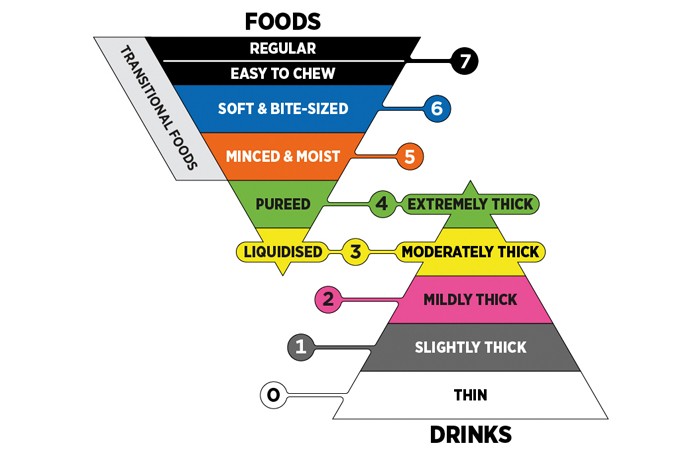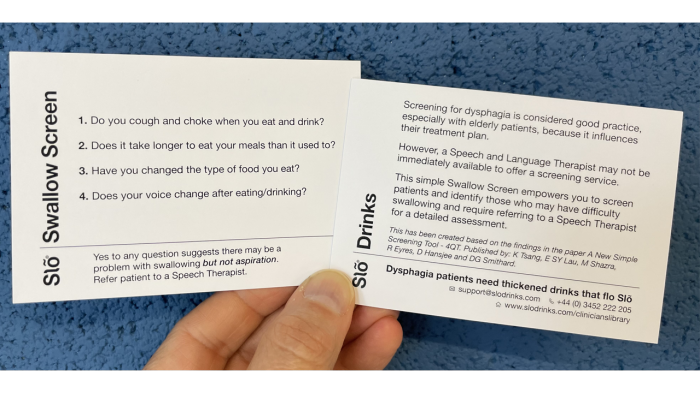In Clinical
Let’s get clinical. Follow the links below to find out more about the latest clinical insight in community pharmacy.Bookmark
Dysphagia refers to any difficulty which disrupts the normal swallowing process and has been reported to occur in up to 50 per cent of elderly patients.
Some of the conditions dysphagia can cause include malnutrition, dehydration, respiratory infections and aspiration pneumonia.1,2
Dysphagia can also arise as a symptom of more than 100 conditions as diverse as stroke, dementia, Parkinson’s disease, and oropharyngeal and laryngeal cancers. And, crucially, it may mean that people experience difficulties swallowing solid medications.1,2
To help screen for dysphagia, UK researchers have created a checklist of four questions based on a literature review. Answering yes to any question indicates a possible swallowing problem.2
The authors assessed the screening questions in 48 frail older people admitted to hospital for reasons other than acute stroke. A speech and language therapist confirmed dysphagia in half of those reporting swallowing problems based on the four questions. Further studies are needed to validate the questions in different groups.2
Slõ Drinks recently launched cards with the screening questions on them (see below) to remind pharmacists and other healthcare professionals (HCPs) to ask about dysphagia.
“The paper was independent from us, but we felt it was so valuable that we wanted to help it reach a wider audience – so we sponsored cards summarising the questions,” says Mathew Done, founder and managing director of Slõ Drinks.
Done founded Slõ Drinks 15 years ago after a speech and language therapist told him about the need for a more palatable thickened drink formulation. At the time, modified maize starch was the only thickener on the market. “Some patients just don’t like the look of thickener in water or its texture,” says Done. Today, a wide range of ready thickened products from numerous manufacturers with different flow rates means that healthcare professionals can tailor products to patients’ swallowing ability.
The International Dysphagia Diet Standardisation Initiative (IDDSI) identifies five levels for puréed food from liquid (3) to regular/easy to chew (7) as well as four levels for thickened drink from thin (0) to extremely thick (4) (see graph below). “The IDDSI levels simplify descriptions of thickened drinks and puréed foods, and provides a common language for patients, carers and HCPs,” says Done.

Swallowing solid forms
It is also important to be aware of the problems some people experience swallowing solid forms. In a study that analysed 792 questionnaires from 675 elderly patients and 117 carers from 17 pharmacies in England and Northern Ireland,3 almost 60 per cent of patients experienced difficulties swallowing tablets or capsules.
Of these, 68 per cent needed to open a capsule or crush a tablet to swallow the medication and 69 per cent admitted not taking a tablet or capsule because swallowing was difficult. Yet 72 per cent of patients and carers reported that their doctor or nurse never asked if they have difficulties taking tablets or capsules. Only 40 per cent told a doctor or pharmacist that they had missed a dose because of difficulties swallowing.3
Xerostomia (dry mouth) can also make swallowing medicines difficult. Between 6-39 per cent of the public and 17-40 per cent of older people in the community have xerostomia.4 Some people who can eat unmodified food still have issues swallowing solid formulations.
“Typically, however, pharmacists do not ask if a patient has a problem swallowing a medicine,” Done says. “Crushing a pill or opening capsules and sprinkling on food can alter the pharmacokinetics and pharmacodynamics.”
Liquid formulations including specials and alternative administration routes could be considered if people have problems swallowing solid formulations.3 A product called Pill-Eze from Slõ Drinks could also help. Patients put the medication on a spoon and cover with 5-10ml of the inert thickened liquid (approximately IDDSI level 3). This forms a bolus that eases swallowing.
For people with diagnosed dysphagia, Pill-Eze is suitable at IDDSI levels 1, 2 and 3. Done says that Pill-Eze does not interact with 100 active pharmaceutical ingredients, although it cannot be used with slow-release tablets. Slõ Drinks is currently in discussions with pharmacies to stock Pill-Eze but, in the meantime, patients can buy it direct from the company.
Educational aids and further information
- Rosemont provides education on swallowing difficulties for pharmacists and has recently launched the Understanding Dysphagia website to support patients and carers
- The paper on the four screening questions
- Copies of the card
- International Dysphagia Diet Standardisation Initiative
References
- Clinical Interventions in Aging 2016; 11:1403-1428
- Geriatrics 2020; 5:11
- Pharmacy in Practice 2005; 15:411-414
- Oral Surgery, Oral Medicine, Oral Pathology and Oral Radiology 2012; 114:52-60
Sponsored
 Sponsored education
Sponsored education
7 steps to managing sore throat
Get to grips with what customers want from their sore throat treatment and upgrade your consultations with this 7-step guide
 Sponsored education
Sponsored education
Helping vapers find a path to quit
Help vapers find a path to a nicotine-free life when they are ready to quit with the first NRT product licensed for this indication


Record my learning outcomes